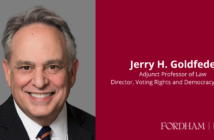Professor Andrew Kent wrote an op-ed for Lawfare on the President’s power to pardon and whether constitutionally Congress can intervene.
President Trump continues to misuse the constitutional power to pardon. Most recently, he commuted the sentence of Roger Stone, seemingly as a reward for Stone’s refusal to tell prosecutors, Congress or the public what he knows about Trump’s involvement with Wikileaks and materials hacked by Russia during the 2016 campaign. And there is no reason to think that the country has seen the last of this behavior. Paul Manafort’s representatives are likely redoubling their efforts to get Trump’s former campaign chairman the same kind of deal as Stone. Trump might fear legal jeopardy, should he lose the election, related to his taxes and business dealings as well as obstruction of justice or other potential crimes committed during the presidency. Trump has made clear that he believes he can pardon himself and has thought about the possibility of doing so: in 2018, he tweeted, “I have the absolute right to PARDON myself . . . .”
…
This post will analyze, first, whether it is constitutional for Congress—by legislation—to ban self-pardons. Next, I ask whether Congress could ban pardons of the president’s family members or confederates, if the president’s motive is to cover up wrongdoing in which the president is involved. And finally, instead of—or in addition to—flat bans on certain kinds of pardons (or commutations), is there anything—besides the Schiff bill—that Congress can do to make it more legally, practically or reputationally costly for a president to corruptly use the pardon power?
Can Congress Ban Self-Pardons?
A statutory ban would likely be constitutional, for a simple reason: the president likely lacks constitutional power to pardon himself. An unauthorized—and hence void—action by the president can be banned by Congress. Even the Justice Department’s Office of Legal Counsel (OLC), which historically takes very broad views of presidential power and immunity from regulation, seems to agree that Congress may ban, including with criminal penalties, actions by a president that are not constitutionally authorized. For instance, OLC opines that there are no constitutional separation-of-powers problems with applying the federal bribery statute to the president because the president has no constitutional authority to commit acts covered by the statute. The same logic should mean that a ban on self-pardons is fine as long as self-pardons are unconstitutional.




